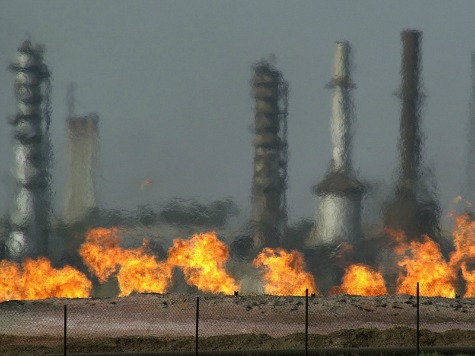
A New York professor has discovered the real reason for the rise and rise of Islamic State in Syria and Iraq: not Islamist fundamentalism, death-cult nihilism or regional power struggles but climate change.
Charles B Strozier, Professor of History at the City University of New York, enlarges on his fascinating thesis at the Huffington Post.
While ISIS threatens brutal violence against all who dissent from its harsh ideology, climate change menaces communities (less maliciously) with increasingly extreme weather. Most of us perceive these threats as unrelated. We recycle water bottles and buy local produce to keep the earth livable for our children — not to ward off terrorists. Yet environmental stressors and political violence are connected in surprising ways, sparking questions about collective behavior. If more Americans knew how glacial melt contributes to catastrophic weather in Afghanistan — potentially strengthening the Taliban and imperiling Afghan girls who want to attend school — would we drive more hybrids and use millions fewer plastic bags? How would elections and legislation be influenced?
As evidence for this novel theory, Professor Strozier – with help from one Kelly A Berkell, attorney and research associate at the Center on Terrorism at John Jay College of Criminal Justice – cites the four-year drought which ravaged Syria from 2006 to 2010, setting off a “dire humanitarian crisis for millions of Syrians”.
He argues:
Drought did not singlehandedly spawn the Syrian uprising, but it stoked simmering anger at Assad’s dictatorship. This frustration further destabilized Syria and carved out a space in which ISIS would thrive.
It is, apparently, a matter of some concern to the professor that this truth is not more widely recognised.
The connection between climate change and conflict continues to evade mainstream recognition, despite reports by think tanks, academics and even military experts. A leading panel of retired generals and admirals, the CNA Corporation Military Advisory Board, recently labeled the impacts of climate change “catalysts for conflict” in vulnerable regions. The Pentagon concluded similarly in this year’s Quadrennial Defense Review that the effects of climate change are “threat multipliers,” enabling terrorism and other violence by aggravating underlying societal problems.
Indeed. We have written about this unlikely alliance between the US military and the climate alarmism industry at Breitbart too. But the conclusions we have drawn on this are not quite as enthusiastic as Professor Strozier’s. Au contraire, the US military’s weird decision to lend its authority (and vast budget) to endorsing the discredited junk science of the warmist establishment is in much the same league of unforgivable irresponsibility and institutional political correctness that made, for example, the Fort Hood massacre possible.
One of the fundamental misconceptions of Professor Strozier’s thesis is the way it conflates a regional drought event with global “climate change”. No reputable climate scientist would ever seek to do this because there are any number of local factors which may cause drought (California’s, for example, was recently discovered to have been caused by changing wind patterns) besides the marginal – and still highly contested – influence of anthropogenic CO2.
Another is the way it accepts without question the projections of alarmist computer models.
He claims:
In the coming decades, Bangladesh stands to lose up to 17 percent of its land to flooding, displacing 18 million people to overcrowded cities and neighboring states.
There is little or no real-world evidence to support this alarming prediction.
Finally, he laments the fact that “our understanding of big picture issues like international carbon emissions and diverse energy sources remains clouded in a political quagmire of competing claims.”
From a history professor this is a worrying statement indeed. The point – surely – about specialising in one of the liberal arts is that you become an expert in critical thinking. But critical thinking is not in much evidence here.
Far from welcoming the open debate and informed scepticism which have prevented our political leaders from adopting the environmental movement’s more harebrained policies, Professor Strozier appears to think that this is undesirable – “a political quagmire”, as he puts it.
Finally, he avers:
When we fail to get the facts right about greenhouse gas emissions, we may unwittingly enable ISIS, Al Qaeda, Boko Haram, Al Shabaab and other extremist groups to flourish.
A grand statement. But not, I think, one would pass in an undergraduate essay without a sly comment in the margins by any half-way decent history prof: “Really? More credible citations needed…”

COMMENTS
Please let us know if you're having issues with commenting.